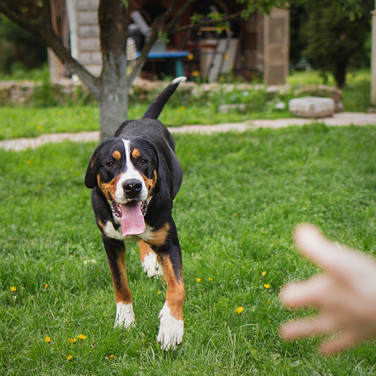ARTICLE
12 Things to Know Before Adopting a Dog From a Shelter - Buddydoc
페이지 정보
본문


Adopting a pet can be one of the most life-fulfilling decisions you'll ever make, but it's not a decision to be taken lightly. Bringing a new puppy or dog into your home requires careful consideration to ensure that both you and your new pet will have a happy and healthy life together. Before you commit to adopting a pet, there are important things you should know and consider to ensure that you are fully prepared for the responsibilities that come with pet parenting. In this article, we'll go over 12 things you should know before adopting a pet to help you make an informed and responsible decision.
-
Potential costs and unexpected expenses
Taking care of a dog can be a rewarding experience, but it requires a lot of financial responsibility. When adopting from a reputable organization, they will usually provide you with your dog's health records, and they may have already taken care of spaying or neutering your dog. They may also be able to provide cost estimates for future care and recommend local veterinarians. If you are not adopting from a rescue, be sure to ask about your dog’s health history and any necessary medical procedures that they may require. Even seemingly healthy dogs can have underlying health issues that need to be addressed. If your dog is not spayed or neutered, this is an important cost to consider, but some programs offer low-cost procedures.
Dogs also require regular vaccinations to stay healthy, especially puppies needing multiple vet visits to ensure proper development. Flea and tick prevention is also essential, particularly during the warmer months. Heartworm prevention is another crucial expense and can help easily prevent a fatal disease that is transmitted by mosquitos.
So the question you should deeply consider before thinking about adopting a dog is can you or your family’s budget afford a dog? In addition to the adoption fees and medical expenses, dogs require other necessities such as bedding, collars, harnesses, high-quality food, treats, toys, and grooming. While the costs can add up quickly, providing proper care for your new pup is always worth the investment.
Below we have provided a short list of some of the costs you can expect to pay when adopting and taking care of a dog:
Adoption fee: $100-$400
Spay or Neuter (most rescues and shelters will cover this for you before adoption) $300-$450
Pet necessities (collar, leash, ID tag, toys, bones, dog bed, crate): $100-$300
Dog food: depending on the size of your dog, can range anywhere from $20 – $80/month
Annual checkup and vaccinations: $150+/year
Monthly heartworm medication: depending on the size of the dog $35/twice a year
Monthly flea and tick prevention: depending on the size of the dog $65/twice a year
Professional grooming (baths, nail trim, etc.): $20+/month
Training classes: $125+ for a 6-week class
In addition to these expenses, there will be numerous expenses that you may have to cover. Hidden costs can include a larger vehicle to accommodate your new dog, cargo liners for the car, extra carpets and crates, pet-specific cleaning products, baby gates, daycares and pet sitters, dog walkers, etc. It is important to consider these extra expenses when deciding whether to bring a dog into your home and budget accordingly to ensure you can provide for your pet’s needs.
-
Rescue dogs come with baggage
Bringing a new dog into your home can come with challenges, whether it is a rescue dog or a puppy from a breeder. Separation anxiety, resource guarding, and potty accidents are common behavioral issues that rescue dogs may bring with them from their previous owners, but they can also occur in dogs from breeders. As a responsible pet parent, it's important to address these issues and consider the responsibility of seeking professional help if necessary. Remember, no dog is perfect, and it's up to you to work with your pet to help them overcome any challenges that may arise. With patience, love, and proper training, you can help your new pup become the best version of themselves.
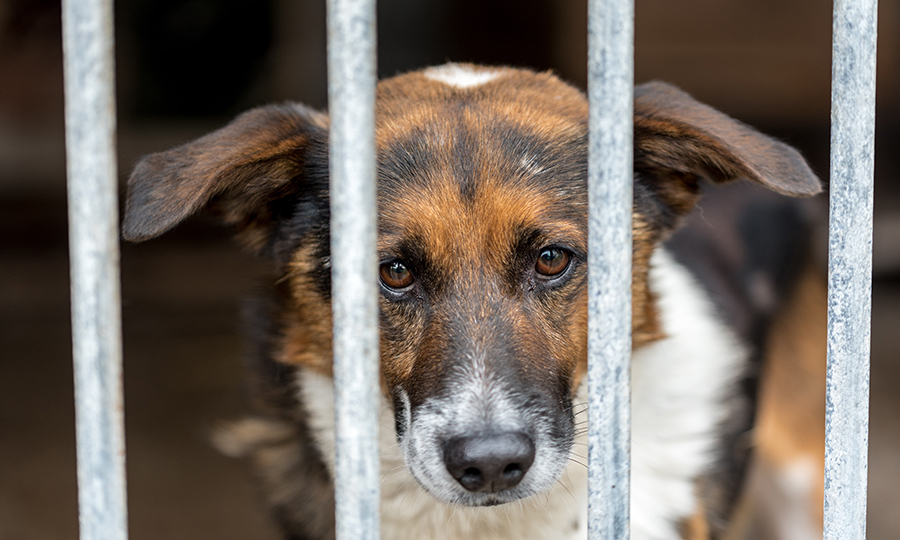
-
Be patient and expect the worst
On that note, while adopting a shelter dog is an incredibly rewarding experience, it's important to understand that it won’t always be easy. Many shelter dogs have been through a lot of transitions, and they may need some time to adjust to their new home. Plan on at least three months before the dog relaxes and begins to trust you. Not all dogs will need this long of a period to transition but expect the worst when considering adopting a new puppy. You can also find Facebook groups and other online communities as a great way to connect with other dog owners and get support during this transition.
-
Less spontaneity and the freedom to travel
As you begin your journey as a new pet parent, you will accept the importance of sacrificing your freedom to take on the responsibility and commitment that comes with caring for your new pup. One of the biggest challenges new pet parents have is figuring out what to do with their pets when they want to go on vacations or have a night out with friends.
If you are someone who enjoys traveling, you'll need to plan ahead and find a dog sitter or a boarding facility or consider bringing your dog along with you. For those who prefer to stay close to home, it's important to recognize that dogs require frequent potty breaks and exercise, so you'll need to be available to take them out every few hours. This can be a challenge if you have a busy schedule or enjoy sleeping in, so it's important to plan accordingly.
-
The importance of grooming
Grooming is an essential part of raising a happy and healthy dog and while it can be a bonding experience between you and your new dog, some pups may need professional grooming. It's important to research how much upkeep your new dog's coat will need, as well as the different options available for grooming, such as bathing at home or opting for weekly grooming by a professional. The amount of grooming your dog will depend on their size, breed, and coat type. Short-haired dogs like Chihuahuas might only need occasional baths, while long-haired dogs like Poodles and Bearded Collies need regular haircuts by a professional dog groomer. Dogs with thick fur usually need regular brushing and may also need baths.
Nail trimming is an essential part of keeping your dog healthy, as long nails can break, snag on something, or affect their gait and nervous system. Many dogs dislike having their paws handled, so it may be helpful to take your pup to the vet or groomer once a month for this task. You can read how to trim your dog’s nails as a new pet parent here.
Dental health is also essential for a dog’s overall health, so it's important to brush your dog's teeth several times a week. Start by introducing the toothbrush slowly and gradually, using positive reinforcement to make it a fun routine for your dog. We have provided a guide on how to brush your dog’s teeth here as well.
-
If you are renting, consider the following
Before adopting a dog, it's important to consider whether your current landlord allows pets. If you rent your home, you may need to move within the next 10-15 years, which can be challenging when you have a dog. Many rental properties don't allow pets, so finding a new home may be more difficult. However, if you are committed to providing a loving home for your dog, it is possible to make it work with a bit of effort and planning. Just be aware of the potential challenges you may face in the future.
-
Healthy lawns may be a thing of the past
It can be challenging to maintain a green and healthy lawn when you have dogs. Dogs love to play outside and run around, which can cause the grass to become thin and patchy. While some companies may offer pet-safe chemical solutions to help maintain a lush lawn, that does not stop your dog from ingesting those chemicals. Dogs have a tendency to eat grass, and after running around they will come inside and begin licking their paws.
-
Walks and exercise are mandatory
As a responsible pet parent, it's important to ensure that your dog gets the exercise they need. Dogs need to be let out of their confined space and taken on walks at least once a day, even if you have a backyard for them to play in. You should ask yourself if you or someone else in the house can commit to walking the dog before and after work every day. Be prepared to spend at least 30 minutes walking your dog each day, though an hour or more may be necessary depending on the breed and energy level of your dog.
It's crucial to keep your pup active, as regular exercise can help keep them healthy and happy. Pups with higher energy levels, like huskies, Jack Russell terriers, dalmatians, border collies, and Australian shepherds, may require more than just a daily walk to release their energy. If they don't get enough exercise, these high-energy dogs can become depressed and destructive.
Before adopting a dog, it's essential to inquire about their energy levels and how much exercise they currently receive. Knowing the breed can also help determine the amount of exercise your dog may need. Playing games with your dog like fetch or hide and seek can also help release some of that pent-up energy.
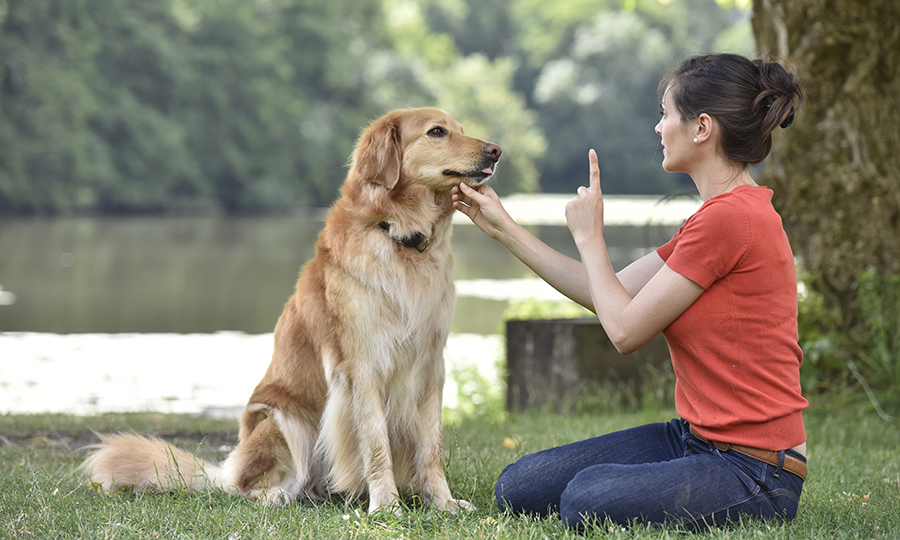
Dog training is also something to keep in mind
Additionally, It's important to note that dog training is an essential part of being a responsible dog parent. It's our responsibility as pet parents to train our dogs to understand our expectations. This doesn't necessarily mean that you have to attend expensive puppy training classes. You may decide that training your dog at home is a better fit for you and your new pup. However, it's important to remember that training is an ongoing process and occurs every day with every action you take.
While hiring an expert trainer can be expensive, it's often more enjoyable to do it yourself as part of a class or group. This is not only less expensive, but it also helps you and your new dog bond while working towards a shared goal. Alternatively, if you're on a tight budget, youtube tutorials, and other online resources are a great source of tips and tricks. Just remember that consistency is key when it comes to dog training.
-
Puppy-proof your house
Puppy-proofing your house is important even if you adopt an adult dog. Common household items like cords, medication, chocolate, and plants can be fatal for dogs. Crawling on your hands and knees through your house can help you identify potential hazards from your dog's perspective. Keep medications and toxic substances out of reach, and remove any dangerous objects from your dog's reach. By taking these proactive measures, you can help prevent accidents and keep your new pup safe. Read more on our guide to puppy-proofing your home here!
-
Dog hair everywhere
Another common issue dog owners face is the constant presence of dog hair. If you're someone who values a spotless home, you may want to reconsider getting a dog. Dog hair seems to find its way into every nook and cranny, and no amount of cleaning can keep up with it. From floors and furniture to clothing and food, you will find their hairs find its way there. If someone in your household has allergies, it's important to consider this before getting a dog as well. Regular grooming and brushing can minimize shedding, and investing in a good-quality vacuum cleaner can help control hair in the home, but ultimately this will be a chore you will have to keep up with to minimize the amount of hair everywhere.
-
The difference between adopting a puppy, a young dog, and a senior dog
Adopting a dog is a big decision, and it can be overwhelming to choose between a puppy, a young dog, or a senior dog. Puppies are cute but require a lot of work, such as potty training and obedience training. Young adult dogs have a lot of energy but are usually potty trained and sometimes have some basic obedience training. Senior dogs are often overlooked but can make wonderful pets as they are typically potty trained, require less exercise, and tend to be calmer and more relaxed.
Ultimately, the decision of which type of dog to adopt depends on your lifestyle, preferences, and resources. If you have the time and energy to invest in a puppy, it can be a rewarding experience. If you're looking for a dog with a lot of energy but don't want to deal with the challenges of raising a puppy, a young adult dog may be a great option. And if you're looking for a calmer, low-maintenance dog, a senior dog may be the perfect fit. No matter which option you choose, adopting a dog can bring years of joy and companionship to your life.
-
Dog tags and microchipping are a must
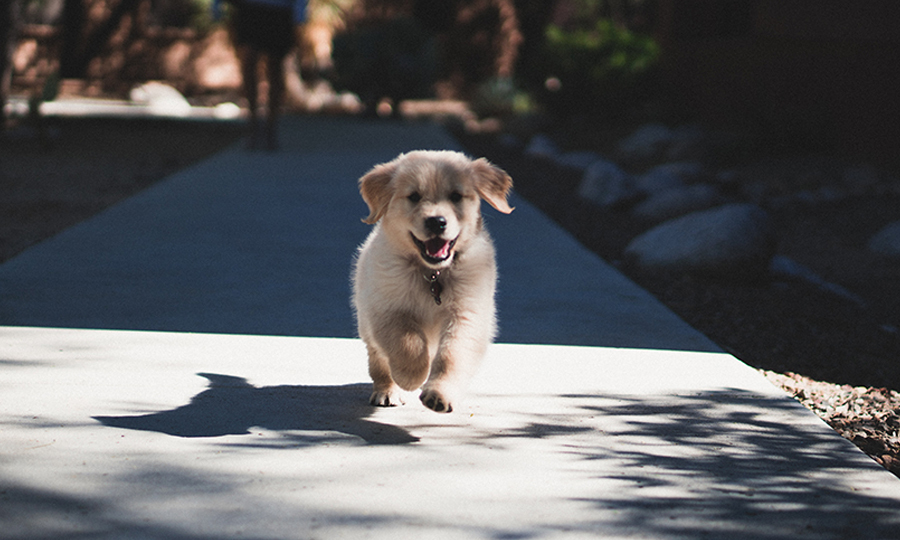
It is important to ensure your dog's safety and well-being by taking measures to reunite them with you if they get lost. Two effective methods are getting a collar with proper identification tags and microchipping, which is a simple procedure done by your veterinarian. Identification tags should have your dog's name and at least two phone numbers for you or your family. Microchips will contain a unique identification number linked to your contact information as well. It is important to keep the information on the tags and microchip up-to-date, including any changes in your contact information. These safety measures increase the chances of a quick and easy reunion with your puppy in case they run off or gets lost.
Conclusion
Adopting a dog can be an incredibly rewarding experience, but it's important to remember that it's a big responsibility that requires careful consideration and preparation. By knowing the 12 things we've discussed in this article, you'll be better equipped to make a decision about adopting your new pup! Whether you're adopting your first dog or adding another to your family, taking the time to prepare and educate yourself will help ensure a smooth and happy transition for both you and your new pet. Lastly, a friendly reminder that adopting a dog is a commitment that will last a lifetime, but with love, patience, and dedication, it can be one of the most rewarding decisions you'll ever make.
Read more on the Buddydoc blog page!
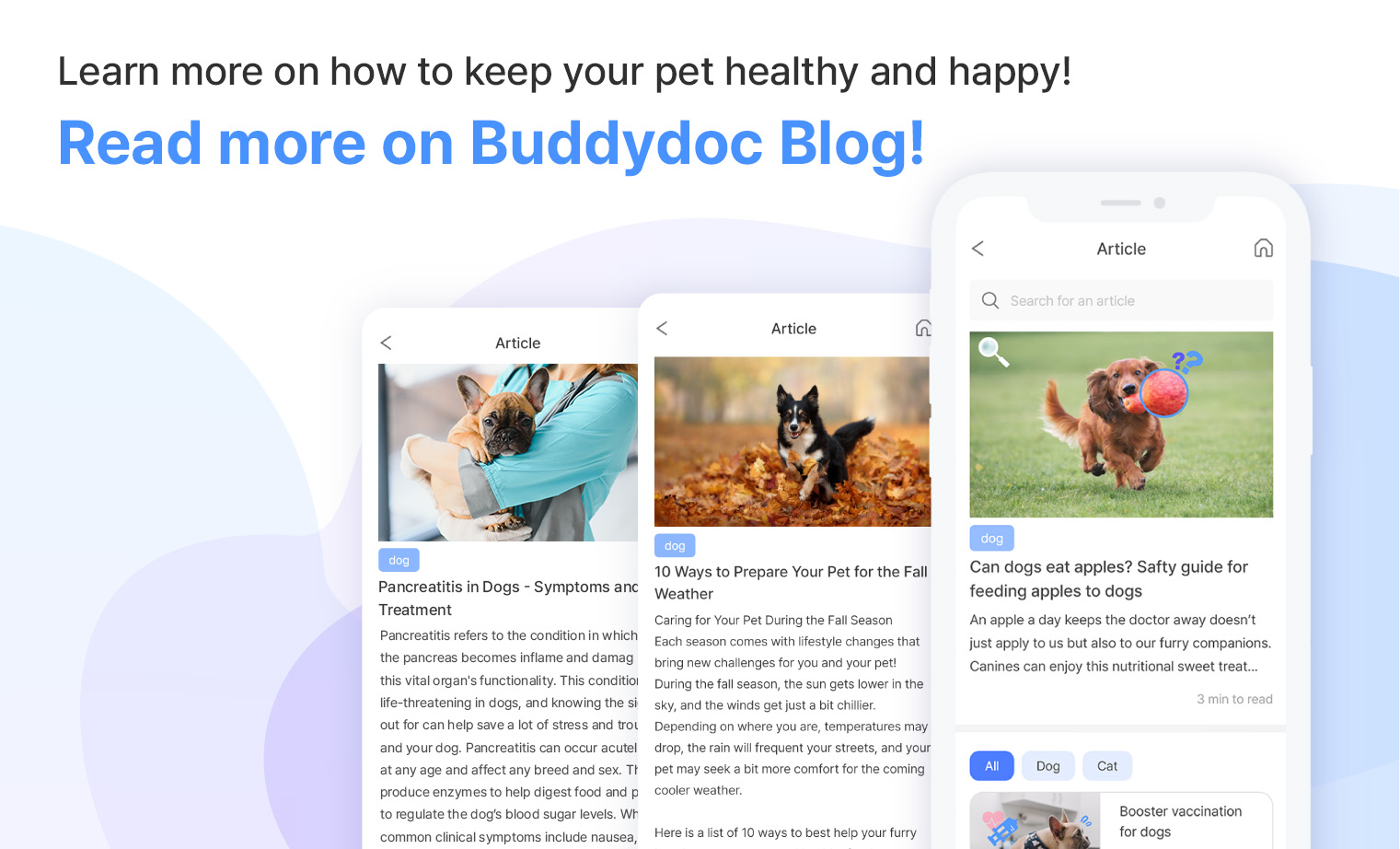
Buddydoc provides a weekly updated blog to keep you informed on the latest and best ways to prepare and take care of your pet all year round. Check out more articles you may be interested in!





